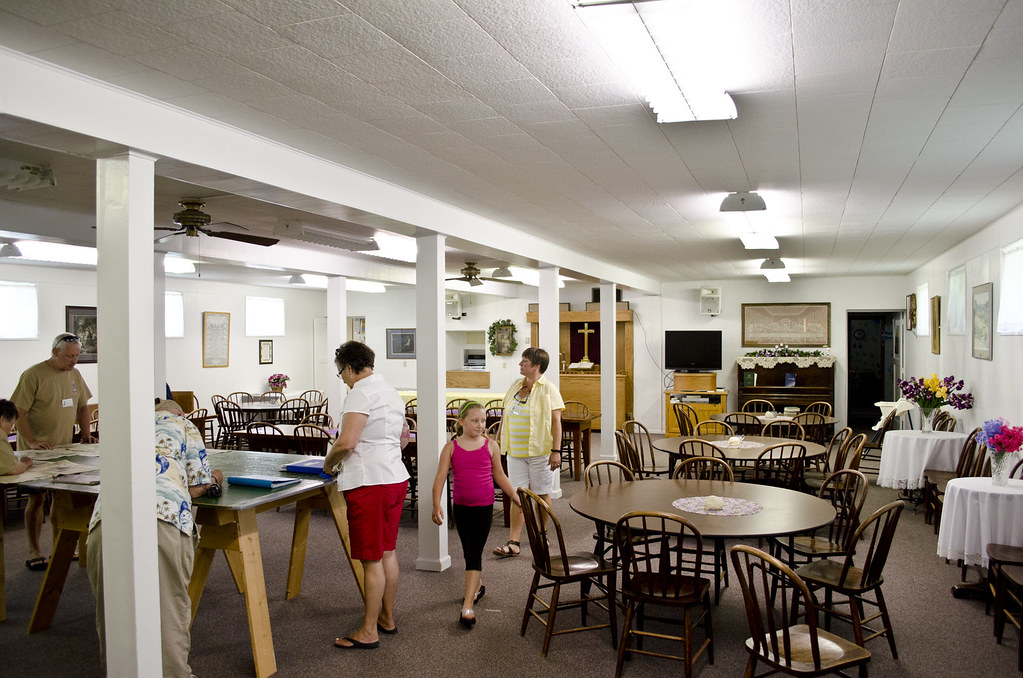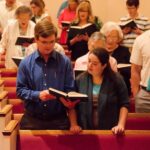Every year, my son and I spend a few hours on a spring morning standing outside a local liquor store to collect money as part of the Knights of Columbus Tootsie Roll drive. I am eager to model Christian manhood, in all its facets, as best I can, but I look forward to it mainly because my son is a lot of fun to talk to. We are usually able to discuss some pretty serious business when we are not chatting up shoppers who generally either love their fellow man or recognize the great possibilities that come with pairing a trunkful of spirits with exactly one tootsie roll. My son has strong and well-considered opinions about subjects as varied as family, fireworks, and Godzilla, and it takes a good deal of time to get down to brass tacks with such things. To put it another way, we have a blast.
The various ministries we take part in through the Knights or our parish often end up being a great deal of fun. I suspect that joy is a lot easier to come by if one is acting as one was made to act. It may very well be true that the fun is not the goal, but I see no reason to deny it if it comes along for the ride. It is an obvious good that local faith communities organize and offer such service opportunities both for the good they accomplish for those in need but also for the training in charity and strengthening of community that await those who participate.
What is less clear to me, though, is the role of those same communities when it comes to the seeking of fun for its own sake. A good parish, I think, ought to help its members integrate the faith into every facet of their lives. If I am a parent, I ought to receive instruction (one way or another) about how to be a parent and a disciple of Christ. If I am a businessman, the parish ought to connect me to the insights of our faith tradition on how to conduct business like a follower of Christ. A less obvious hypothetical might be if I am, say, a drinker of beer who is especially fond of drinking beer in the company of others who are similarly inclined. Is that part of my life outside the purview of the parish? Is that sort of thing simply separate from my walk with the Lord?
The Council of Trent cautions the faithful against corrupting holy things with alcohol-fueled shenanigans: “the celebration of the saints, and the visitation of relics (shall not) be by any perverted into revellings and drunkenness; as if festivals are celebrated to the honour of the saints by luxury and wantonness.” For those of us beholden to an imago Dei-oriented understanding of the human person, there is a real temptation to suppose that even those bouts of drunkenness that manage to have nothing to do with saintly relics might be something of a problem. Despite being unfashionable, temperance remains a virtue worth cultivating for anyone eager to draw nearer to the Lord.
On the other hand, Thomas Merton includes a fascinating idea in The Seven Storey Mountain. Remembering a wedding he had attended with his father in rural France as a young boy, Merton recalled how “The peasants and the foresters and the others who were there certainly ate and drank tremendously: but they never lost their dignity as human beings. They sang and danced and played tricks on one another, and the language was often fairly coarse, but in a manner which was more or less according to custom, and on the whole the atmosphere was good and healthy, and all this pleasure was sanctified by a Sacramental occasion.” Can such merriment be sanctified, as Merton suggests, or is it merely something that one must hope can be excused?
The first time I can remember sitting on a barstool, I was about eight years old, and it was in the basement of my family’s parish, St. Boniface. If you are picturing a young boy exploring some kind of church rummage sale, may the Lord bless you, but that is not right at all. I was sitting on a barstool because my dad and I were sitting at the bar in our church’s basement. From what I understand, all six of the Catholic parishes in Manitowoc had a bar, though I only ever saw four of them. These subterranean taverns were not, by any means, the source and summit of parish life, but they did a serviceable job of providing a setting for the parish-sponsored sports teams, men’s clubs, ladies’ clubs, and family gatherings of various kinds that maintained people’s sense of connectedness to parish life.
Returning to that earliest barroom recollection, it must have been after either the Easter Vigil or the Christmas Midnight Mass. The parish always had socials after these liturgical celebrations, with platters of dainties and plenty of coffee and juice. For the members of the men’s choir (of which my father was a part), though, these were times for strong drink and masculine camaraderie. Despite the late hour of these holiday trips to our parochial pub, I was always permitted one soda and one candy bar, with the candy bar being free if I agreed to crush all the cans. Crushing those cans was my very first contribution to parish life. I do not remember much about what the men talked about, but these teachers, factory workers and employees of the city were clearly enjoying the time together, knowing that they had just contributed something important, their wonderful voices, to a solemn but happy night.
As I got a little older, I came to experience the basement bar as the nerve center for the monthly bingo night that almost my entire extended family seemed to help run, along with a host of other parishioners. My cousin and I would patrol the parish hall with our cart loaded with soda, popcorn, and candy bars to sell, and we would get to spend considerable time in the bar, surrounded by the men who, to a considerable degree, made the parish function. They had no sacramental responsibilities, and only a few of them sang in the choir, were lectors, or served on the parish council, but they did seem to be the ones always painting, trimming trees, or repairing the many things that could, and often did, malfunction in our aged church.
Now, the theologian in me is ready to declare that the social benefits of parish life should always take a backseat to the main events of hearing God’s word and receiving the Eucharist, but experience tells me that people are eager to hang around long after such grace-fueled nourishment has been received, if they have both a reason to and pleasant place to sit. Much of what I remember from the bar had absolutely nothing to do with the faith that was practiced a bit more obviously upstairs. A number of the men always seemed to be swapping fishing tips, or comparing the number of years it would be until they retired. It was there that I fell in love with the smell of cigar smoke. I could probably even recall, if forced, the unpleasant details of a conversation or two that I had no business listening to. What I am supposing, however, is that all the socializing that used to take place in the old parish bars now takes place either somewhere else, or nowhere at all. Are either of those alternatives clearly better than what we had?
I was in high school when they closed our parish. I turned twenty-one after all the church bars in the city had gone away. That younger version of me was quite successful in making a fool of myself in taverns throughout the city on at least a few notable occasions. It is entirely conceivable, and maybe even probable, that I would have managed to pull off the same level of stupidity if I had been drinking in my parish’s basement bar, but I am tempted to doubt it. After all, I went to confession on those same grounds, and the Lord was always present in the tabernacle just upstairs. There is extraordinarily little encouraging one to cultivate virtues of restraint in a typical bar, if that is where one is learning what it means to be a consumer of alcohol. If one is taking his first legal sips in the company of fellow parishioners, though, it may well be a different story.
I am entirely sure that each one of those parish bars witnessed its share of people not recognizing where their limits ought to have been. It may be more dignified in the end, though, for that to happen in the midst of a community whose bonds have deep liturgical roots and whose core identity places a premium on things like virtue but also on forgiveness. I am unquestionably sympathetic to those who would argue that parishes have little business being in the tavern business. Parishes are in the reconciling-people-to-the-Lord business, however, and such people are occasionally in need of community and in need of fun. It is possible to have fun without drinking, of course, but even we beer drinkers could stand some assistance with seeing how grace might heal our fallen natures as beer drinkers. Drinking need not lead to drunkenness, but temperance is like all the other virtues in that it needs to be learned and practiced. Could a retrieval of the parish bar be in order? Might our local faith communities support such cultivation of virtue, while also restoring what might again be a hub of parish social life? It seems to me that the seeking of fun can be made holy if it is subject to an overarching desire for virtue and done with an eye toward the strengthening of community.
Image credit: Flikr





3 comments
John Klar
I love the sentiment but I must demur. Until fentanyl took over, alcohol killed more people in the US than all other drugs combined. Its history as a corrupt influence is ancient: the very term “spirits” reportedly derives from Latin American beliefs that liquor released people’s human demons. It is hard to see the “virtue” of alcohol in church when some hard-core alcoholics may seek the sanctuary as an escape from just that thing. Billy Graham preached in bars — but abstained. Scripture says do not drink to excess, or lead other sinto sin. How would the church regulate excessive behavior, and how much of French drinking is tied to a culture very different from the alcohol-abusing US? I have drank a lot of wine in France and Italy — it is a huge cultural difference. I also spent years as a criminal defense attorney, helping people reclaim their lives from the total destruction of alcoholism. Now I counsel people in opioid recovery: perhaps churches should offer other drugs, to stimulate the camaraderie of virtue? I’m also a pastor — CS Lewis says we are not teetotalers, and I agree. But the only booze in the church should be the wine for communion….. Parish bars likely disappeared for good reason — modern industrial humanity can’t handle drugs due to people’s alienation and misery (summarizing Wendell Berry’s writings on the subject).
John Klar
I have “drunk”…. 🙂
Christian
Great stuff. I would love to see a revival of parish bars (and parishes as the focal points of their communities more broadly). It would be interesting to know what led to the demise of parish bars in the first place to determine whether a revival is possible.
Comments are closed.